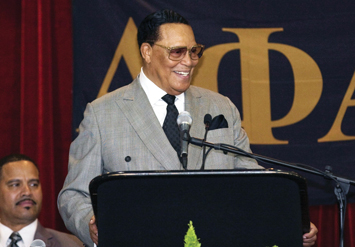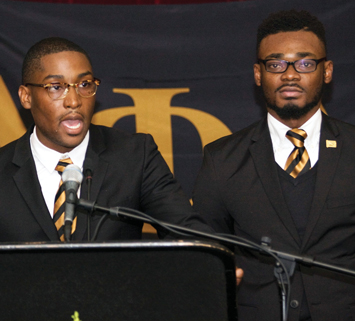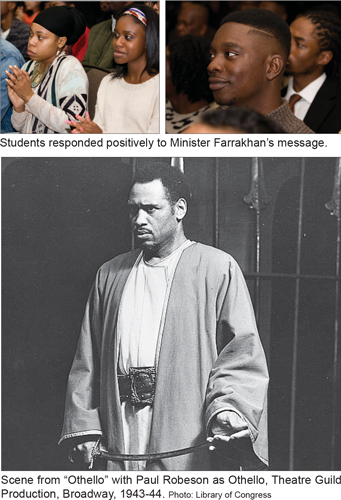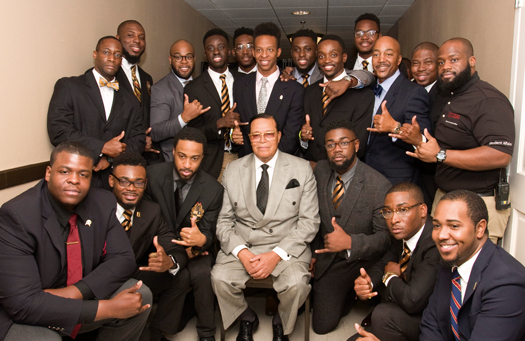Forward Ever, Backward Never, The Life, Legacy And Value Of Paul Robeson
By Richard B. Muhammad - Editor | Last updated: Nov 23, 2016 - 4:49:54 PMNEW BRUNSWICK, N.J.—The effort to bring Louis Farrakhan to Rutgers University was met with severe opposition: Lies were told about the Nation of Islam minister, false charges were lodged against him and the event organizers, Alpha Phi Alpha fraternity’s chapter on campus, were charged thousands of dollars to try to have the outspoken and beloved leader speak at the university for free.

Min. Farrakhan spoke Nov. 19 to students at Rutgers University. Photos: Andrea Muhammad
|
“I don’t charge college students because the greatest gifts of all are you,” said the 83-year-old leader, who has been teaching for some 60 years. Min. Farrakhan called young people “the love of my life” and said he treasured every opportunity to impart knowledge to make their life struggle a little less difficult and to have youth avoid past mistakes made in the battle for Black liberation.
It isn’t that Farrakhan is violent, but true revolution comes through knowledge and which is like bringing light to Black people, he said. It’s also like cockroaches who run when the lights are turned on in an apartment, he said. The audience laughed and applauded.
He denied false charges he was a misogynist. “I’m anti-sup-posed to be everything, but anti-woman? My mother is the greatest woman in my life and I would not be who I am without her. I am married to my wife for 63 years and she really is the wind beneath my wings,” he said. We teach honor, love and respect in particular for Black women but for all women, without you we don’t exist, there is not future for any nation without the honor, elevation and protection of the female, he added.
And, the Minister added, hopefully the professors who have had to so much to say about me are here.

At left, Abdul Rahim Mahmoud, vice president of the Delta Iota chapter of Alpha Phi Alpha, and chapter President Nana Kweku Annoh.
|
He spoke of a kinship with Mr. Robeson, calling him a hero.
“You are college students and should never be afraid to hear ideas coming from someone else,” he said. “You are intelligent. … When a college is afraid to have a man like me come on campus and spread all kinds of rumors that make you fear me and want to stone me,” he said. But that same thing was done to Paul Robeson, Prophet Muhammad, Jesus and all wise people who bring light that brings people out of darkness and ends their misuse as tools and slaves of the enemy. Mr. Robeson didn’t drink, he didn’t smoke, he didn’t use drugs, he pursued excellence, said Min. Farrakhan.
If you are afraid of White people and refuse to stand for truth, you don’t know Mr. Robeson, he said. In the late 1930s and 1940s, he challenged White mistreatment of Blacks and traveled outside of America to Russia and Africa, said the Minister. Mr. Robeson studied scientific socialism but was branded a Communist, persecuted and had his passport taken, he explained.
White theatre owners denied Mr. Robeson the ability to make a living at home and then the U.S. government deprived him of the right to make a living abroad, he said. Mr. Robeson earned a law degree but was unable to use it and was an incredible singer and performer, said Min. Farrakhan.
Mr. Robeson had integrity, which isn’t taught in college, he said. Mr. Robeson developed into a man of high character and the basis of good character is honesty, said Min. Farrakhan.
If you are a college professor you should not be afraid to deal with truth to protect your job, he said.
Growing up Mr. Robeson learned how to appease and not threaten Whites but he was hated by some of them and envied for his gifts and intellect, said Min. Farrakhan.
 |
The current animosity is rooted in a system of White supremacy and domination over Blacks who are the original people of the planet, which was proven by historian Ivan Van Sertima, another Rutgers graduate and scholar. They don’t teach you about Mr. Van Sertima because his research will destroy the lies of western education, the Minister said.
“They don’t want you to know the real truth of who you are,” said Min. Farrakhan. “Right now you are struggling to find yourself so you are everything. Nobody should use any tool to make you into themselves.” But, he said, your natural religion is Islam and Whites made you Christians and did not find it incompatible for Blacks to be Christians and slaves, he said.
The myth of Black inferiority and the lie that Blacks did not have high civilization is part and parcel of higher education and what is taught at Rutgers, he said. Blacks were denied the right to read for 300 years and the libraries of the native peoples in South America were destroyed by Whites, he said.
In addition to a corrupted education rooted in White supremacy, the focus on education is to make money, the Minister said. But Mr. Robeson’s father taught him integrity is more important than amassing wealth, he said.
At the height of his career, earning $100,000 a year, Mr. Robeson decided to speak out against the hurt and pain of Black people, said the Minister. He suffered and his income dropped to just $6,000 a year, he added.
Mr. Robeson was as big as Michael Jackson and was an artist rooted in the culture of his people, early on he only sang songs written by Blacks, Min. Farrakhan said. People think that when you are greatly gifted you will not sacrifice those gifts for something bigger than yourself, he added. But Mr. Robeson didn’t care just as NFL quarterback Colin Kaepernick doesn’t care and speaks to the hurt of Black people, he said.
“What price are you willing to pay for the liberation we seek? It’s not going to come easy,” he told the students.
“I am not anti-White, but I am antilies, anti-injustice and anti-those things that make a human being less than what that human being potentially can achieve,” said Min. Farrakhan.
“(Mr. Robeson) was hated because of his love for you. Why are you hated Farrakhan? Because of my love for you. Paul was willing to die to see Black people in a better place, he didn’t learn that at Rutgers,” said the Minister.
Mr. Robeson was called before the House Un-American Affairs Committee, and he confronted them, continued Min. Farrakhan. Asked why didn’t he stay in Russia or Africa, Mr. Robeson responded that America is where he lived, had a right to live, and called the congressmen fascists, he said.

The men of the Delta Iota Chapter of Alpha Phi Alpha with the Honorable Minister Louis Farrakhan. The Black fraternity organized the Minister’s recent visit and lecture to students on campus. Photo: Andrea Muhammad
|
So the American government was his enemy yesterday and remains the enemy of the Black community today, warned Min. Farrakhan. They fear the growing Black population, just as it is written of pharaoh in the bible feared the growth of the birth of the children of Israel, he said.
The U.S. government targeted Marcus Garvey, Dr. Martin Luther King, Kwame Ture (Stokely Carmichael) and Black organizations, fearing the rise of a Black messiah who wanted an independent nation for Blacks, he said. They want Farrakhan, the Minister added.
“When he parlayed his cultural genius into a spokesperson for our hurt, they did everything they could to destroy him. Brothers and sister you have a chance to make your life a meaningful life. … Paul Robeson found his purpose in life and he built his life from principles that never die,” the Minister told the students.
Storm Ervin, a graduate student, was impressed by the Minister’s lecture. “It was how he was able to break down White supremacy on college campuses that you’re not going to learn in school. It was fascinating to hear. Because every time I hear about Farrakhan I hear about his relations to the Nation of Islam and the movement at large but for him to make it specific to college campuses and I’m a college activist. So that was really intriguing to me,” she said.
She wore a Black sweatshirt that read “The Liberation Of All African People.” A graduate of the University of Missouri, she was at the school as racial problems erupted on campus last year. Blacks at Mizzo and southern rural schools face blatant White supremacy and see disparity in hiring, she said. “Black students again being called a nigger is common, it’s not uncommon from White students. It’s pretty upsetting. There was a Black student at Mizzo last week who had a gun pulled out on him by a Trump supporter,” she said.
Ms. Irvin was hearing the Minister for the first time. His words about the choices students face were real to her. “About two days ago I had this fight, ‘ok are you going to speak your truth and be real or are you going to play safe—play the respectable Negro in the situation?’ I chose not to. And the reason I chose not to is because it’s a disservice to your people to use your education, which is a privilege in America, to not speak the truth or to not make freedom a real thing for your people. It’s a disservice. Because you are here on the backs of Black slaves, our Black ancestors. So you have to it’s your duty,” said the St. Louis native.
“I can’t say on how he used to be but I do think today he addressed the issue of being misogynistic or women hating and he defended that and said he wasn’t. But I appreciate that, I appreciate him bringing up, ‘well this is how I’m not.’ I think that shows real leadership.… Because sometimes you can be critiqued and say ‘whatever’ and that’s not what he tried to do,” she said.
“Some of the main points that I feel Brother Farrakhan was able to make in his public speech was the call for unity. I think that’s the biggest issue that’s kind of seen today on the campuses and in the community and kind of every aspect. I feel like that’s the main point that we need to make is the call for unity especially being a member of a fraternity,” said Ivan Thompson, a senior from Cumberland, N.J., majoring in human resources and labor studies. He is a member of Phi Beta Sigma fraternity. He will be graduating in December.
“We see that there’s so much emphasis on differences between fraternities that at the end of the day we forget that we’re also here for the same cause and from the same population. We’re here to unite the Black population with everybody as a whole in general. And I feel like we’re not actually taking the steps that we need to take in order to empower the community and uplift like we need to be doing.”
Abdul Rahim Mahmoud, a Rutgers student and vice-president of the Delta Iota Chapter of Alpha Phi Alpha, worked with others since last year to bring the Minister to the school. It was initially estimated $10,000 would be required for security costs for a room limited to 500 people. The final cost may be $5,000. The pressure was so heavy that even the Paul Robeson Cultural Center on campus reportedly gave a $700 donation but didn’t have its name on the event flier. The Minister chided the center, saying Mr. Robeson was no coward and a center that carries his name should reflect his strength.
The Minister spoke as Rutgers celebrated its 250th anniversary and a report detailed the school’s connection to slavery from its earliest days. There had also been anti- Trump protests by students.
A very deceptive structure uses people after they are dead and that was not going to be allowed to happen with Paul Robeson who was a member of Alpha Phi Alpha at Rutgers, said Brother Mahmoud. There have been racial issues on campus since the Trump election and it is often difficult for Black students to graduate, added Brother Mahmoud, who is also a member of Mosque No. 25.
Black students are disrespected, he said. “I would want the Black student body and the Rutgers student body as a whole to actually revolutionary think and revolutionize their train of thought. And actually question and evaluate, if you just take something because a professor said it, that doesn’t make it valid. But actually investigate and get to know a man or woman before they judge that person’s character,” he said. When they lied on the Minister, it was war, said Brother Mahmoud.
For more information or to assist the Delta Iota Chapter of Alpha Phi Alpha fraternity contact deltaiota1906@ gmail.com.
No comments:
Post a Comment